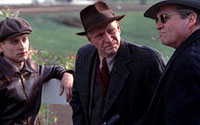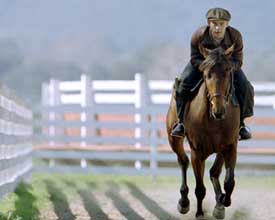|
restoring our biblical and constitutional foundations
|
In Praise of “Seabiscuit”
“God forbid that I should go to any heaven in which there are no horses.” Robert Cunninghame-Graham in a letter to Teddy Roosevelt in 1917.
In the daily sandpaper of marriage, family, and work, bruises are inevitable. John Bunyan confessed, “Oh, it is hard continuing believing, continuing loving, continuing resisting all that opposeth.” Jonathan Edwards warned, “The degree of religion…is to be judged by the fixedness and strength of habit that is exercised in affliction.”
All of us carry burdens. But in a sense that’s the good news, because the raw materials for growth come to us in our troubles. Growth is nothing less than positive response to our difficulties. It’s learning to make lemonade out of our lemons, and its recipe includes the fact that lemons can taste really sour.
 In
the movie Seabiscuit you will find a fellow lemonade maker or
two—one even comes in horse flesh—who are finding on their road the same
lessons you find on yours. The movie reminded me of several lessons I’ve
learned from my four-footed equine companions.
In
the movie Seabiscuit you will find a fellow lemonade maker or
two—one even comes in horse flesh—who are finding on their road the same
lessons you find on yours. The movie reminded me of several lessons I’ve
learned from my four-footed equine companions.
Mutual trust between horse and rider is essential. A horse is basically a lazy thing and will usually try to get his own way. If you show any degree of fear, the horse will eagerly take advantage of you. Thus, if you are nervous while you are working around a horse, he will be nervous. One of the biggest reasons why there is a lack of trust between horse and rider is that most people just do not ride their horses enough. For many, the horse is only a status symbol. When they finally do attempt to ride, they find themselves with a hooligan by the halter. I make it a habit to ride my horses regularly to keep them in the habit of obedience. If they spend too much time in the pasture, their responses get rusty and they are inclined to want to have their own way.
 Success
can be barriers to more learning. Seabiscuit’s owner may have been
satisfied with his horse’s level of proficiency, but his trainer wasn’t.
While an owner of this type has a lot to be proud of within his limited
sphere, he will have to swallow his pride in order to improve his product.
After all, if you’re winning, it hurts to admit that your horse might need
some adjustments to improve his ability. But there’s always room for
improvement, especially when the motivation is a match race with the
nation’s most talented horse.
Success
can be barriers to more learning. Seabiscuit’s owner may have been
satisfied with his horse’s level of proficiency, but his trainer wasn’t.
While an owner of this type has a lot to be proud of within his limited
sphere, he will have to swallow his pride in order to improve his product.
After all, if you’re winning, it hurts to admit that your horse might need
some adjustments to improve his ability. But there’s always room for
improvement, especially when the motivation is a match race with the
nation’s most talented horse.
Every horse is an individual. Just watch Seabiscuit’s jockey as he rides him. He talks to—no, “with”—the horse constantly: words of assurance, encouragement, affection. It is this “bonding” between horse and rider, I think, that makes a rider face all the hard work needed to overcome whatever physical problems his horse may have and to undo the mistakes others have made with him.
Always read a horse. Few people know how to do
this as well as Seabiscuit’s jockey and trainer do. Most of us are so used
to a mechanical world that we can’t imagine a horse having ideas of his
own. But anyone who is serious about becoming a good rider must learn to
“read” a horse—to understand his language so that you can listen to him
 intelligently.
I’ve ridden my horses so many times that listening and reacting have
almost become reflex actions. A horse’s eyes can tell you a lot (as in the
movie), though only on rare occasions should you ever look a horse
directly in the eye. Watch their body movements, their tail and their
feet. This is the one big secret of expert horsemanship—listening to what
your horse says. If you don’t know what he is going to do, you can’t
encourage or discourage it.
intelligently.
I’ve ridden my horses so many times that listening and reacting have
almost become reflex actions. A horse’s eyes can tell you a lot (as in the
movie), though only on rare occasions should you ever look a horse
directly in the eye. Watch their body movements, their tail and their
feet. This is the one big secret of expert horsemanship—listening to what
your horse says. If you don’t know what he is going to do, you can’t
encourage or discourage it.
Never spoil your horse. Some people are too rough on their horses, while others are too easy. Both are horse spoilers. Like most of God’s creatures, horses have a pecking order. What you have to do is to establish that you are one notch above every horse you ride. This doesn’t mean that you have to beat a horse into submission. Horses must be handled firmly, with fair and consistent discipline (again, that’s why regular training is vital). Never let a horse discover that he’s bigger and stronger than you are. The goal is a partnership with your horse, in which you provide the brain power and he provides the motor power. Proof of success is a horse equally keen, disciplined, and attentive both indoors and out.
I’ve never felt sorry for people who didn’t have certain temporal possessions. But I must confess that I really do pity someone who has never known the pleasure of the unique partnership that exists between horse and rider. This is true especially when you’ve had the chance to train up a young horse yourself, when you take him out as you have “made” him, not as someone else, more of a horseman than you, has “fixed him up” for you.
The horse is a very special gift. How to properly handle this quick creature that outweighs you eight to ten times is a unique challenge in life. It always grieves me to hear of a person who mistreats his horse. That’s why I enjoyed Seabiscuit so much, for here’s a movie that shows what is possible when horse and rider are truly in sync.
The German equestrian expert Rudolph Binding once said: “Das Pferd ist dein Spiegel. Es spiegelt dein Temperament. Es spiegelt auch deine Schwankungen” (The horse is your mirror. It mirrors your temperament. It also mirrors your weaknesses). Smugness has never been the genuine horseman’s vice. The human rider, even when mediocre, has a mute companion on whom he relies to make up for his shortcomings. The fact is that my horses may have learned much from me, but I have learned so much more from them.
August 19, 2003
David Alan Black is the editor of www.daveblackonline.com.